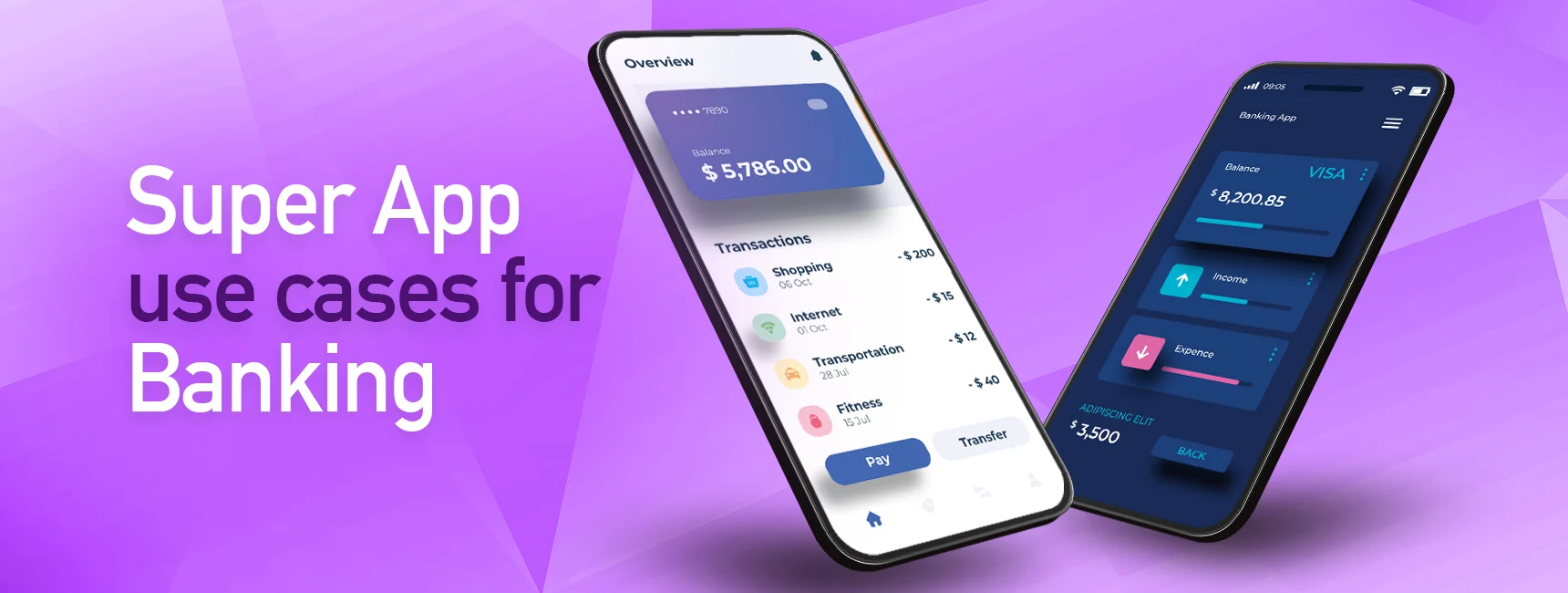Super App Use Cases for Banking

As platform-based business models gain traction, with 7 out of the top 12 1 global corporations having adopted them, the market is witnessing a change from single-purpose to multipurpose apps, often known as super apps. Customers can utilize a smart app for various services, such as processing payments, e-commerce, booking tickets, communication, gaming, and more.
Many mobile app users are interested in combining numerous digital experiences into a single comprehensive super app. As a result, people are particularly devoted to apps that provide a multidimensional experience.
What is a super app?
A super app is a platform for products and services that are provided using internal and external technology integrations. It is a single app that offers a wide range of services, such as the ability to pay bills, schedule rides, perform banking activities, and place food orders.
A super app, created to meet daily demands, integrates several features into a convenient user interface through an ecosystem of other apps. Examples include AliPay, WeChat, Grab, Rabbi, and many others.
Some advantages of super apps include:
- An effective all-in-one super app strategy fuels growth.
- They provide more methods to interact with current clients.
- They allow businesses to obtain new clientele through partnerships.
- They entice significant investment.
- By keeping users with additional services, you can lower the cost of reacquisition.
What are some super app use cases for banking?
Many consumers are now comfortable doing more activities online and on their smartphones since using apps has become ingrained in their daily routines. These tasks include going shopping, banking, holding meetings, arranging transportation, and more.
As a result, customer expectations are altering quickly, causing a seismic upheaval in the financial sector. Convenience is becoming increasingly in demand, and banks' success in the digital economy is largely determined by their ability to create quick, customized, and seamless consumer experiences.
To take advantage of this transformation, banks worldwide are redesigning their business models with a single objective: to create a super app that covers the full customer experience and provides its clients with products and services from other industries on a single platform.
To give its users a smooth experience, super apps incorporate financial services into their platforms. This impacts banks because more users may use super apps instead of banking apps due to the greater integration super apps provide. Users of super apps with digital wallets also discover that it’s easier to stay within the super app ecosystem and depend very little on cash and credit cards.
Several banks have already entered the super app ecosystem by delivering unbranded banking as a service to the applications, facilitating this seamless link. However, many super apps don't want to handle the financial services regulatory environment independently because it is complex and spans several markets and regulatory regimes.
This indicates that super apps that offer e-commerce, loans, insurance products, investing platforms, and more are forming strategic alliances with banks and fintech in their main regions to deliver these services.
Super apps could become a much greater source of competition for banks than either neobanks or fintech companies if their popularity rises. Maintaining user engagement on their platform might make it nearly impossible for banks to persuade users to switch from the super app to their independent digital banking apps.
What should banks do?
In general, banks have three alternatives for dealing with the growth of super apps:
- Accept market changes and strive to remain competitive by marketing their offers.
- Increase their reach by integrating (potentially unbranded) services within super apps or other digital financial services.
- Compete with super apps by establishing a comprehensive super app that includes financial and nonfinancial offerings.
Super apps are practical and simple, serving as a unified platform for numerous tasks. Super apps have extensive and exclusive access to user data because they operate across various industries. Additionally, banks have a chance to enter the super app ring as open banking gains greater traction.
To learn more about the state of super apps, check out KOBIL's report,State of Global Super Apps 2022.
1https://www.mckinsey.com/capabilities/mckinsey-digital/our-insights/five-fifty-platform-plays
